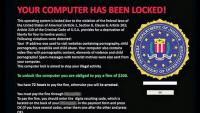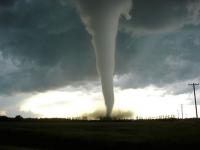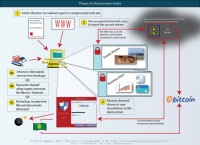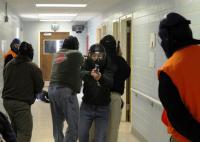-
Banning Muslim face veil at the work place not discriminatory: Austria’s Supreme Court
Rejecting employees’ requests to wear a veil at work is not discriminating against them, Austria’s highest courts has ruled. In the landmark decision, Austria’s Supreme Court (OGH) ruled that if items of clothing prevent communication, an employer may legally ban them at the work place. The question of whether or not Muslim women should be allowed to wear the Islamic veil at the work place or public schools – or even at public — is the subject of intense debate in Europe, and many states have legislated against it.
-
-
Ending extortion: Researchers develop a way to stop ransomware

Ransomware — what hackers use to encrypt your computer files and demand money in exchange for freeing those contents — is an exploding global problem with few solutions. The FBI issued a warning in May saying the number of attacks has doubled in the past year and is expected to grow even more rapidly this year. It said it received more than 2,400 complaints last year and estimated losses from such attacks at $24 million last year for individuals and businesses. Researchers have developed a way to stop ransomware dead in its tracks.
-
-
Bahamas warns young men traveling to U.S. to “exercise extreme caution” around police
The government of the Bahamas late last week has issued a travel guidance to young Bahamian men travelling to the United States on holiday, warning them to “exercise extreme caution” when interacting with the U.S. police officers. “Do not be confrontational and cooperate” with the police, the Foreign Ministry’s travel guidance says.
-
-
U.S. suffered at least $8 billion climate-related disasters so far this year

We are only halfway through 2016 and the United States has already seen eight weather and climate-related disasters* that have each met or exceeded $1 billion in damages. These eight disasters resulted in the loss of thirty lives, and caused at least $13.1 billion. Since 1980 the United States has sustained 196 weather and climate disasters in which overall damages/costs reached or exceeded $1 billion. The total cost of these 196 events exceeds $1.1 trillion.
-
-
Understanding California electricity crisis may help prevent future crises
Between 2000 and 2001, California experienced the biggest electricity crisis in the United States since the Second World War. Exactly how it happened, however, is complex. New research now reveals insights into the market dynamics at play, potentially helping regulators standardize the market and prevent future crises.
-
-
Don’t believe the Brexit prophecies of economic doom
The shock and horror at the Brexit vote has been loud and vociferous. Some seem to be reveling in the uncertainty that the referendum result has provoked. But there are plenty of reasons to reject the consensus that Brexit will be costly to the U.K.’s economy. Even though markets appear stormy in the immediate aftermath of the vote, the financial market reaction to date has more characteristics of a seasonal storm than of a major catastrophe. There will undoubtedly be winners and losers from the U.K.’s decision to leave the EU. But indexes for volatility are already lower than they were in February this year, suggesting that markets are not abnormally worried about the outlook, and U.K. government borrowing costs are at an all-time low. This is further reason to reject the pre-referendum consensus that Brexit would bring economic doom.
-
-
Brexit: Europe’s new nationalism is here to stay
The British referendum that has delivered a vote for “Brexit” is the latest, dramatic indication that the atavistic nationalistic impulses of the twentieth century – impulses which the construction of the EU was supposed to lay to rest — are here to stay. This nationalism has brewed largely in reaction to how the EU has evolved over the past few decades. What started as a common market grew to embrace a single currency, the Schengen area, and integration in justice and home affairs. What we have witnessed with the rise of Euroscepticism is the recrudescence of a robust form of populist nationalism. It is sincerely anti-intellectual, offers facile solutions to complex problems, prefers what it calls “plain-speaking” over a well-articulated elocution, and is utterly unapologetic in its disdain for the establishment. Unless the EU can infuse its institutions with greater democratic legitimacy — voters need to be able to identify with the people who make decisions on their behalf — this populist nationalism will persist for the foreseeable future. The United Kingdom may be the first country to leave the EU but it may not be the last. Europe’s new nationalism is here to stay.
-
-
Iran’s use of civilian planes to arm Assad could jeopardize $25B Boeing deal
The $25 billion aircraft deal that Boeing recently struck with Iran could be jeopardized by Tehran’s continued support of Syrian dictator Bashar al-Assad. Boeing’s jets will be sold to the state-owned Iran Air, which was sanctioned by the Treasury Department in 2011 partially due to its transport of “potentially dangerous Islamic Revolutionary Guard Corps (IRGC)-related cargo” and “missile or rocket components” to Syria. A Western intelligence report seen by Reuters in 2012 noted that Iran continued using civilian aircraft to transport large amounts of arms and personnel to aid Assad.
-
-
Tips on how to avoid ransomware attacks

Individuals and businesses have become targets to a growing online fraud scheme known as ransomware. Ransomware is a form of malware used by cyber criminals to freeze your computer or mobile device, steal your data and demand that a “ransom” — typically anywhere from a couple of hundreds to thousands of dollars — be paid. The FBI, ransomware victims lost more than $18 million between April 2014 and June 2015.
-
-
Preparing for the worst case scenario

The number of incidents involving armed attackers (active shooter incidents) has been on the rise over recent years with attacks taking place around the world — from the United States to India, from Norway to France to Kenya. Control Risks says that its Active Shooter training helps increase awareness of the threat and, in the worst case scenario, how best they can protect themselves.
-
-
Terrorism and tourism: what cities should do to prepare for an attack
Citizens of the U.S. and the world were deeply shocked and saddened when a gunman shot and killed about fifty patrons at an Orlando nightclub this past weekend. While the shooter’s primary targets were the people enjoying an evening out, a secondary object of such incidents is typically tourism, with the aim of terrorizing a population so much that people don’t travel there, thereby harming the economy. An examination of how cities and other destinations react to shootings and other situations that negatively affect tourism reveals that there are several important lessons about what cities can do to assure tourists they can maintain their safety. Destinations that take a greater leadership role and provide accurate, relevant, and timely information to their visitors are more likely to win in this zero sum game. Those that are unorganized or silent are more likely to lose. Ultimately, tourists vote with their pocketbooks, and a destination’s relative safety may determine where they take their next trip.
-
-
Global small arms trade reached $6 billion in 2013
The Small Arms Survey’s Trade Update 2016: Transfers and Transparency reports that the world’s “top” and “major” small arms exporters delivered at least $5.8 billion worth of small arms in 2013, an increase of 17 percent compared to the $5 billion worth exported in 2012. The United States exported a record $1.1 billion worth of small arms in 2013. Transfers of small arms to the United States ($2.5 billion) alone accounted for 42 percent of all imports.
-
-
Inside ISIS' looted antiquities trade
For excavators – archaeologists, but also looters like the Islamic State, or ISIS – the opportunity for discovery in modern Iraq and Syria is dazzling. Everyone seems to agree that ISIS is digging up and selling archaeological artifacts to make money. But no one seems to agree on how much money it’s actually making from its illegal antiquities trade: amounts have ranged from $4 million to $7 billion. Patchy data and methodological challenges do not fully explain why $7 billion fell to $4 million in public discussions about the ISIS antiquities trade. While market mystique and over-the-top plot lines are fine for Hollywood films and adventure novels, it’s no way to understand terrorist finance, and without that understanding we are unlikely to arrive at genuine and lasting solutions.
-
-
New alloy to boost rare-earth elements production
Rare earths are a group of elements critical to electronics, alternative energy, and other modern technologies. Modern windmills and hybrid autos, for example, rely on strong permanent magnets made with the rare earth elements neodymium and dysprosium. Yet there is no production occurring in North America at this time. Researchers have developed aluminum alloys that are both easier to work with and more heat tolerant than existing products. The alloys — which contain cerium — have the potential to jump-start the U.S. production of rare earth elements.
-
-
HIPAA audits and what you need to consider to keep your organization compliant

HIPAA has long been a regulation which has been confusing, in many aspects requiring a legal degree to understand the complexity and exactly how to become and remain complaint.HIPAA was enacted in 1996, and it has taken twenty years for it to become the elephant in the room it is today.The regulation has become more sophisticated based on the overwhelming increase in data breaches with the medical industry experiencing the greatest impact.
-
More headlines
The long view
Ransomware Attacks: Death Threats, Endangered Patients and Millions of Dollars in Damages
A ransomware attack on Change Healthcare, a company that processes 15 billion health care transactions annually and deals with 1 in 3 patient records in the United States, is continuing to cause massive disruptions nearly three weeks later. The incident, which started on February 21, has been called the “most significant cyberattack on the U.S. health care system” by the American Hospital Association. It is just the latest example of an increasing trend.
Chinese Government Hackers Targeted Critics of China, U.S. Businesses and Politicians
An indictment was unsealed Monday charging seven nationals of the People’s Republic of China (PRC) with conspiracy to commit computer intrusions and conspiracy to commit wire fraud for their involvement in a PRC-based hacking group that spent approximately 14 years targeting U.S. and foreign critics, businesses, and political officials in furtherance of the PRC’s economic espionage and foreign intelligence objectives.
European Arms Imports Nearly Double, U.S. and French Exports Rise, and Russian Exports Fall Sharply
States in Europe almost doubled their imports of major arms (+94 per cent) between 2014–18 and 2019–23. The United States increased its arms exports by 17 per cent between 2014–18 and 2019–23, while Russia’s arms exports halved. Russia was for the first time the third largest arms exporter, falling just behind France.
LNG Exports Have Had No Impact on Domestic Energy Costs: Analysis
U.S. liquified natural gas (LNG) exports have not had any sustained and significant direct impact on U.S. natural gas prices and have, in fact, spurred production and productivity gains, which contribute to downward pressure on domestic prices.
